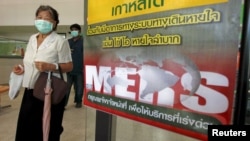Two more foreigners, relatives of Thailand’s first case of Middle East Respiratory Syndrome, considered “high risk contacts,” are being tested for MERS, public health officials said Friday evening.
The 75-year-old businessman from Oman had traveled Monday to Thailand with family members on an Oman Air flight for treatment of a heart condition.
Specimens collected from the patient’s son and nephew have been sent to a laboratory and results are expected to be known in 48 hours, Dr. Pasikorn Akrasewi of the department of disease control told VOA on Friday evening.
The man’s son, who has been caring for his father, is showing “minimal symptoms,” while the nephew has been sneezing, said Pasikorn.
All of the man’s family members have been isolated at the Bamrasnaradura Infectious Diseases Institute, on the northern outskirts of Bangkok.
Family members
The concerned son has been difficult to keep apart from his father, who is reported in stable condition, a situation complicated because no hospital staff can speak Arabic to adequately explain to the family members the critical need to keep them separated while test results are awaited, Pasakorn said.
Bumrungrad International Hospital has confirmed that the elderly man was admitted the same day he arrived in Thailand to the highly regarded facility, which treats more than 1 million patients a year, 20 percent of them from the Middle East.
Thailand is a medical tourism hub, with foreigners flocking here to undergo such procedures as cosmetic surgery, gender reassignment and heart operations that are frequently more affordable and safer than in their home countries.
Bumrungrad officials on Friday said 58 staff members have been placed in quarantine for two weeks, but the hospital is continuing to operate normally.
A total of 85 people who were in contact with the Omani, including those on board his flight to Bangkok, are being monitored at hospitals or in their homes for any sign of illness, Thai authorities said.
Prime Minister Prayuth Chan-ocha, who heads the kingdom’s military junta, declared Friday that Thailand was well prepared to handle the situation, based on past experiences.
“Please don’t panic. We are taking care of this,” Prayuth told reporters. “We have to help each other and please be careful.”
Of similar virus as SARS
MERS is caused by a coronavirus from the same family as the one that triggered China's fatal outbreak of Severe Acute Respiratory Syndrome (SARS) 12 years ago.
The vast majority of MERS infections and deaths have been in Saudi Arabia, where more than 1,000 people have been infected since 2012, and about 454 have died.
South Korea has been hardest hit in Asia, with 24 deaths, a total of 166 infections and about 6,700 people quarantined since the first confirmed case on May 20.
Health officials in Seoul Friday declared that the worst is over there for the MERS outbreak after the virus spread through hospitals.
“We have judged that it has leveled off,” said Kwon Deok-cheol, the South Korean chief policy official of the health ministry. “But we need to watch for a further spread and further cases from so-called intensive control hospitals.”
South Korea President Park Geun-hye told World Health Organization chief Margaret Chan Friday in Seoul that her government plans to cooperate with foreign experts in fundamentally drawing up a quarantine system to better cope with new types of contagious diseases, the Yonhap news agency reported.
China and the Philippines also have reported one MERS case this year.
An outbreak in Thailand could have a significant impact on the economy of the southeast Asian country, which is more heavily dependent on tourism than South Korea.
Eighteen million people are forecast to visit Thailand this year. Tourism-related stocks suffered a sharp drop in Friday’s trading, with the benchmark SET index closing down more than one percent.
Rebuke of air standards
The sector was hit not only by fears about MERS but also by the U.N.’s International Civil Aviation Organization (ICAO) rare rebuke Thursday of the kingdom’s aviation standards.
The ICAO had given Thailand 90 days to address safety concerns before it issued a public “red flag” on its safety audit website, a designation given to only 12 other countries.
Prayuth Friday downplayed its significance – noting that “at this time no country has banned our flights.”
The junta boss requested the Thai media and the public not “speak too much about this, there may be discord.”
Tourism, a major industry in Thailand, has been suffering since late 2013 when sometimes violent political protests broke out on the streets of the capital.
A May 2014 bloodless coup by Prayuth, at the time the country’s army chief, put an end to all political activity but an extended period of martial law also gave pause to some potential visitors.
Martial law was lifted more than two months ago, but the junta retains control of all branches of government and maintains sweeping powers against any dissent.












